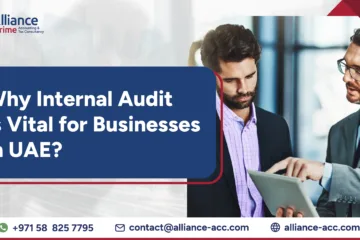Financial fraud poses a significant and growing threat to businesses in the UAE within today’s intricate business landscape. To fortify your business against these risks, especially in sectors like financial advisory and internal auditing, it is imperative to adopt robust strategies that address various forms of financial fraud prevalent in the region.
Prominent Forms of Financial Fraud in the UAE:
Financial fraud manifests in different ways in the UAE, ranging from email scams to lottery fraud and deceptive fund transfers. Businesses, including those offering financial advisory and internal auditing services, must be vigilant and take precautionary measures to mitigate these risks effectively.
Email Fraud:
A common tactic involves receiving fraudulent emails purportedly from the UAE Central Bank, falsely claiming frozen accounts. To counter this, businesses, especially those in financial advisory and internal auditing, must exercise caution, verify the authenticity of such communications, and refrain from sharing sensitive personal information.
Lottery Scam:
Fraudulent lottery schemes often reach businesses, including those providing financial advisory and internal auditing services, via WhatsApp, featuring logos of well-known UAE brands. These scams entice recipients with substantial cash prizes, urging them to contact specified mobile numbers. Businesses should exercise caution and avoid disclosing sensitive financial details.
Fund Transfer:
Given the bustling trading environment in the UAE, businesses, particularly those with financial advisory and internal auditing services, frequently engage in global transactions via email. However, these communications can be compromised, leading to fraudulent fund transfers. Implementing precautionary measures is crucial to thwart unauthorized access and financial losses.
Strategies for Safeguarding Business from Financial Fraud:
Effective protection against financial fraud requires the implementation of comprehensive strategies. For businesses offering financial advisory and internal auditing services, establishing a strong anti-fraud culture, conducting risk assessments, and implementing internal controls are critical steps.
Establish a Strong Anti-Fraud Culture:
Creating an ethical corporate culture is foundational to an effective anti-fraud strategy. Businesses, especially those providing financial advisory and internal auditing services, should foster an environment where employees not only comprehend the gravity of financial fraud but also feel encouraged to report suspicious activities.
Conduct Risk-Assessment:
Understanding the unique vulnerabilities of your business, particularly in financial advisory and internal auditing, is essential. Through comprehensive risk assessments, businesses can pinpoint potential weak points in their financial processes, enabling the development of targeted anti-fraud strategies tailored to specific needs.
Implement Internal Controls and Policies:
Solid internal controls are the first line of defense against financial fraud. For businesses offering financial advisory and internal auditing services, segregating financial duties, establishing clear approval processes, and regularly updating policies are crucial steps to minimize risks effectively.
Secure Financial System:
A sturdy financial system is fundamental to protection, especially for businesses offering financial advisory and internal auditing services. Leveraging secure accounting software, encryption, and multi-factor authentication, along with regular software updates, helps guard against vulnerabilities and monitor system access.
Prioritize Cybersecurity:
In the digital age, prioritizing cybersecurity is paramount for businesses, including those offering financial advisory and internal auditing services. Strong firewalls, antivirus software, data backup plans, and continuous employee training to identify and thwart phishing attempts are essential components of a robust cybersecurity strategy.
Insurance Coverage:
Mitigating risks through insurance policies covering various aspects of financial fraud, such as theft, employee dishonesty, or cyberattacks, is a crucial safety net. Collaborating with experienced insurance brokers ensures tailored coverage aligned with specific risks for businesses offering financial advisory and internal auditing services.
Cases of Financial Fraud:
Exploring notable cases such as Enron, Volkswagen, Lehmann Brothers, Wells Fargo, Bernie Madoff’s Ponzi scheme, and the recent Wirecard scandal provides valuable insights into the consequences of financial fraud and emphasizes the importance of preventive measures, including for businesses offering financial advisory and internal auditing services.
The Next Big Bubble—Cryptocurrency Fraud:
Highlighting potential vulnerabilities in the cryptocurrency market, including the lack of sovereign backing, volatility, and confusion surrounding their functioning, underscores the need for caution in this evolving financial landscape. As the market grows, businesses, particularly those offering financial advisory and internal auditing services, must remain vigilant to prevent fraud in the cryptocurrency space.
Ensuring Better Prevention of Financial Frauds:
Studying Governance Mechanisms:
Strengthening governance at the board level and delegating authorities effectively form the foundation of a fraud prevention strategy. Whistle-blower policies that protect those reporting fraudulent activities contribute to a more vigilant corporate environment, especially for businesses offering financial advisory and internal auditing services.
Audit Environment:
Promoting a transparent audit environment involves establishing clear external and internal audit charters. Open communication between auditors and periodic re-evaluation of audit committee roles are essential for maintaining the integrity of the process, particularly for businesses with financial advisory and internal auditing services.
Stakeholder Relationships:
Vigilance in stakeholder relationships involves scrutinizing financial terms with banks, monitoring supplier relationships, and identifying customers with unusually favorable terms. These practices help in proactively identifying potential fraud risks for businesses, including those offering financial advisory and internal auditing services.
Business Model and Sector Performance
Questioning the sustainability of the business model, visualizing future financial scenarios, and investigating reported earnings relative to industry peers are vital steps in preventing financial fraud. Clear justifications for earnings exceeding industry averages must be established, especially for businesses with financial advisory and internal auditing services.
Conclusion
In today’s business landscape, safeguarding against financial fraud is not an option but a necessity. Implementing these strategies will help protect your business from the various forms of financial fraud and ensure its long-term success. Remember, prevention is an ongoing commitment that pays dividends in safeguarding your business’s financial health.
By incorporating these strategies and promoting a culture of vigilance, your business can effectively safeguard against the pervasive threat of financial fraud.


